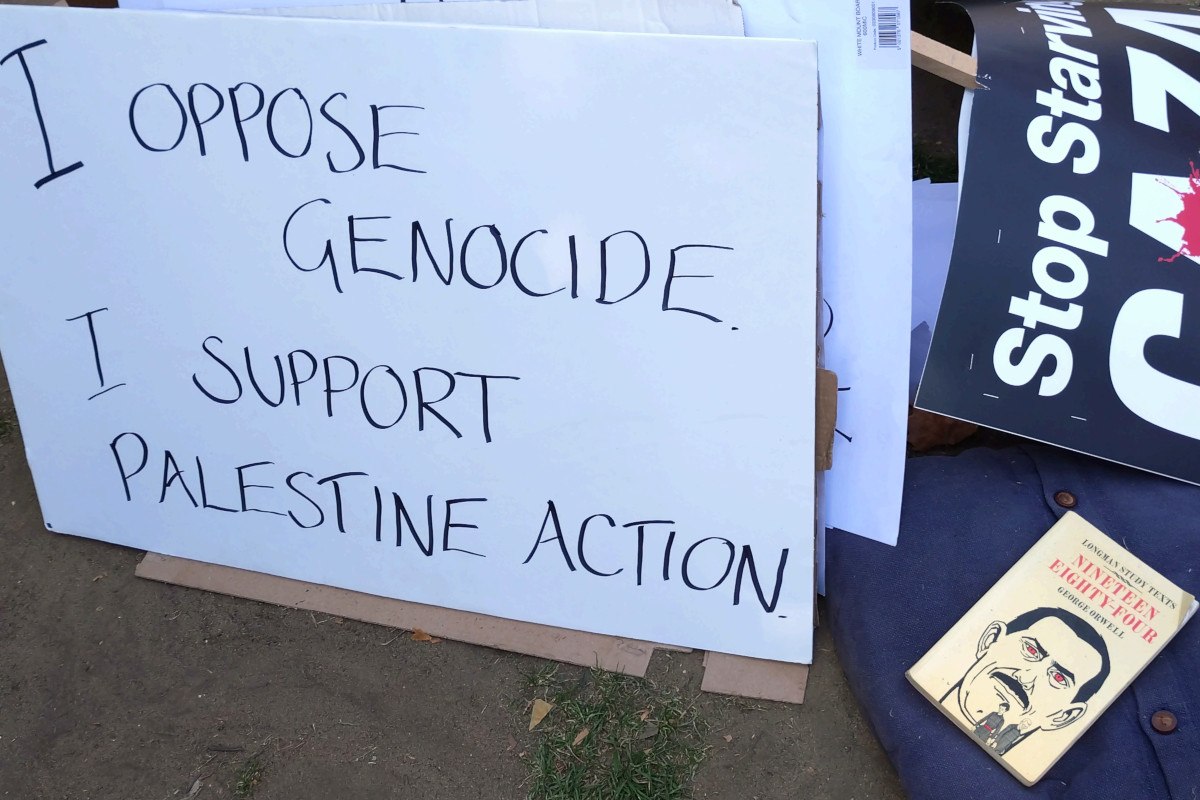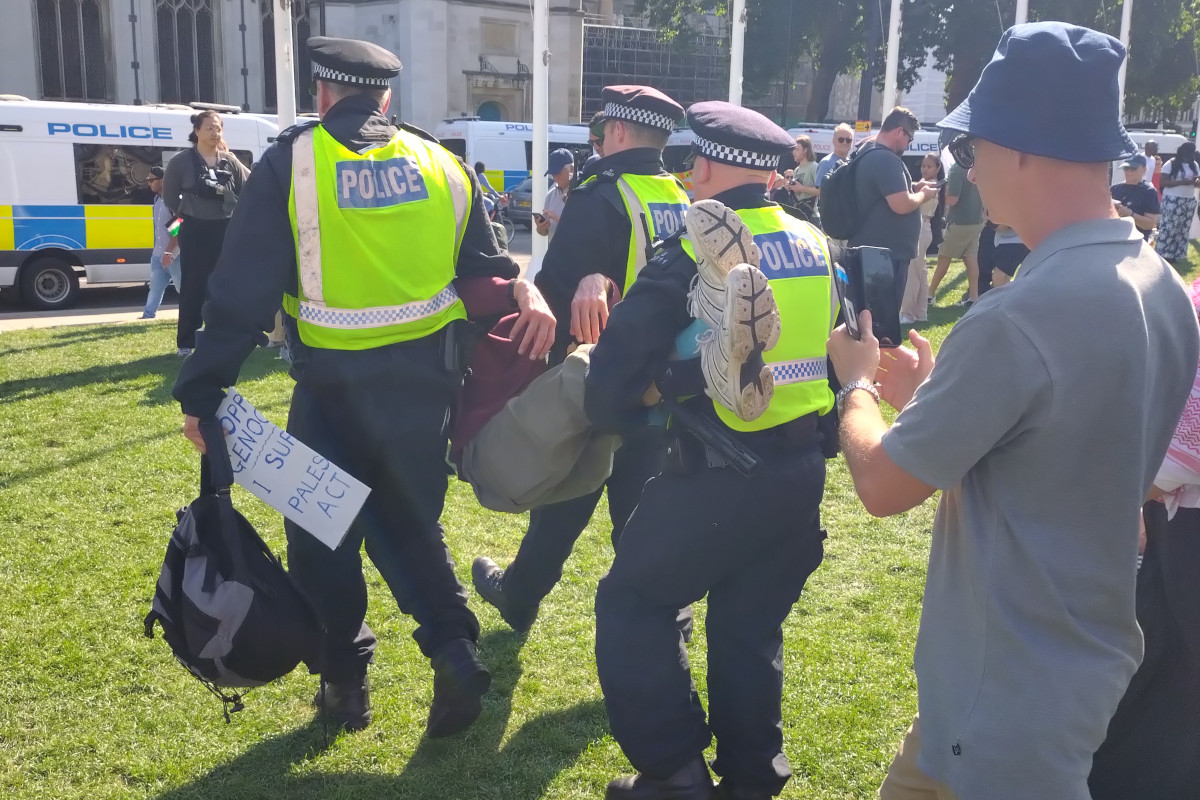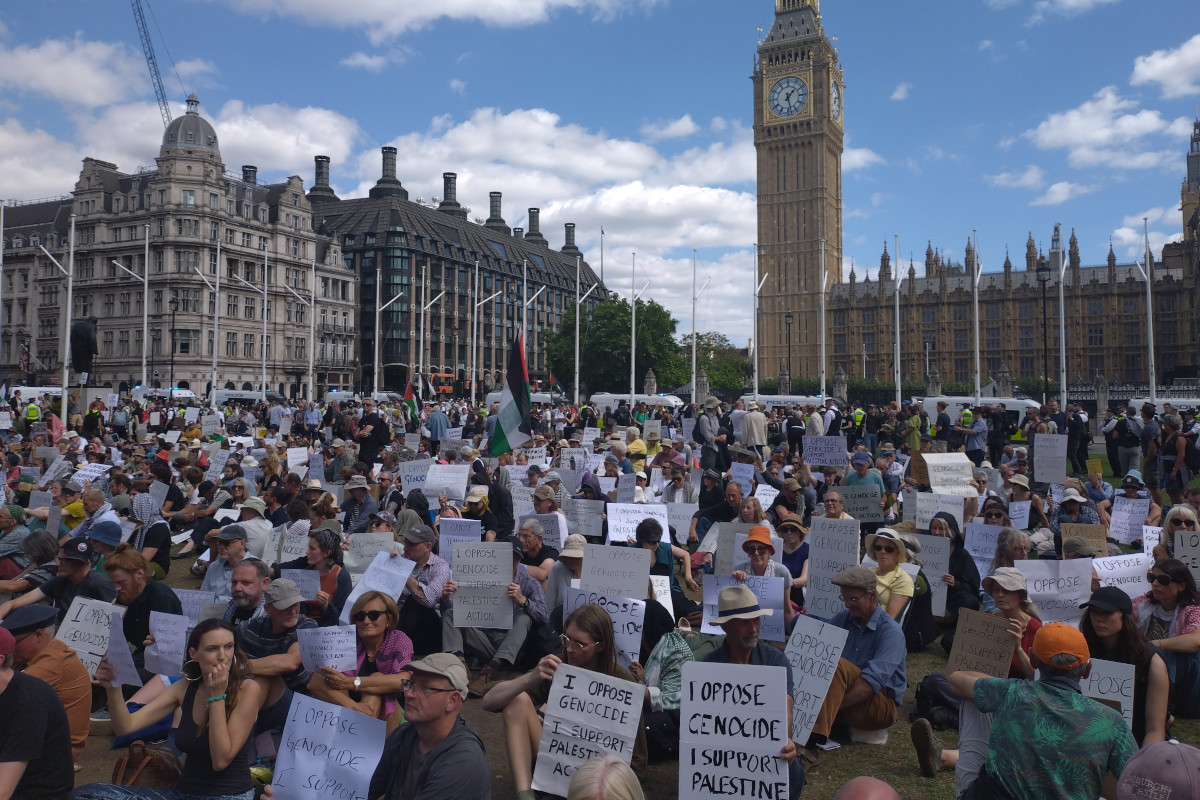UK: Peaceful protesters treated as terrorists as politicians fuel far-right activity
Topic
Country/Region
15 August 2025
Thousands of police were deployed to London last weekend to arrest more than 500 peaceful protesters, as racist protests took place across the country. There is a relentless crackdown on foreign nationals, now including immediate deportation for any non-citizen convicted of a criminal offence. Critics warn that mainstream political rhetoric is legitimating and fuelling violent far-right activity.
Support our work: become a Friend of Statewatch from as little as £1/€1 per month.

Image: Statewatch
Mass arrest
On Saturday 9 August, British police officers arrested 532 people in London’s Parliament Square on charges of supporting a proscribed terrorist organisation.
The reason? Holding placards saying: “I oppose genocide. I support Palestine Action.”
Statements such as this are now punishable by up to 14 years in prison, following the government’s decision to ban Palestine Action at the beginning of July.
The ban was introduced after members of the group entered a Royal Air Force base and sprayed planes with red paint to protest against the UK government’s support for Israel’s genocide in Gaza.
That support includes British planes carrying out surveillance flights over Gaza and sharing the resulting intelligence with Israel.
Sustained mass protests since October 2023 have also called for an end for UK arms exports to Israel, the introduction of trade and economic sanctions, and for a halt to the UK’s diplomatic support for the country.
Targeting migrants
As hundreds of pensioners were being arrested on Saturday, the justice secretary decided it was an appropriate time to announce the latest in a swathe of new measures against migrants.
The government will change the law so that foreign nationals handed down prison sentences will be deported immediately, rather than part-way into or after serving their sentence.
This comes alongside plans to extend the “deport first, appeal later” system, under which foreign nationals with criminal convictions are only able to file an appeal against their deportation after they have been deported.
The government also announced last week that it had detained the first “illegal immigrants” under the new UK-France treaty designed to stop small boat crossings.
These moves come as far-right protests are increasing in scale and scope across the country, primarily targeting asylum-seekers housed in hotels by the government. There have also been a number of violent attacks on asylum-seekers.
An open letter signed this week by more than 200 organisations, including Statewatch, calls for a halt to the “pernicious and insidious currents of racism and hatred,” and the “divisive politics, racist rhetoric and demonising language” used by many political parties in the country, including the governing Labour Party.
The Institute of Race Relations argues that the government “has never openly acknowledged” that many of those behind the protests and the violence are far-right ideologues and their followers.
This de-politicises and de-contextualises far-right violence, argues the organisation, and instead presents “anti-migrant and racially incendiary protests outside asylum accommodation and mosques as legitimate, as long as they remain peaceful, and a public order challenge when they are not.”
Thus, concludes the IRR, “the government has effectively abandoned asylum seekers to the intimidatory tactics and naked violence of the far Right.”
Cheers and jeers
There is, however, clearly no intention of abandoning those protesting the ban on Palestine Action: Saturday’s operation was one of the largest mass arrests in the UK in decades.
The detention of those holding placards began at around 13:00 and did not finish until around 21:00. While some chose to stand and walk off with police, many others were carried by five or six officers at a time.
Hundreds of supporters were present, with each arrest accompanied by cheers for the arrestees and jeers for police officers.

“She looks like a real threat to national security,” said one onlooker as the police carried away a white-haired person dressed in the purple, white and green colours of the suffragettes.
Yvette Cooper, the home secretary, was derided for hypocrisy for wearing those colours in celebration of the suffragettes on the same day she announced the ban on Palestine Action in parliament.
The protester in the suffragette colours was not the only white-haired protester present on Saturday: half those arrested were over the age of 60, according to police data.
Mass opposition
The protest, which was organised by the group Defend Our Juries, demonstrates the scale of opposition to the government’s decision to proscribe Palestine Action.
Representatives of the group have permission to challenge the ban in court in November, but the state is clearly determined to keep it in place.
There were hundreds of officers in Parliament Square and there were reportedly 3,000 riot police deployed across London on Saturday, with a separate march for Palestine once again bringing hundreds of thousands of people onto the streets.
Senior political and legal figures have also started speaking out against the ban, including Peter Hain, a former Labour government minister; Shami Chakrabati, a Labour peer in the House of Lords; and Lord Sumption, a former senior judge.
“Yvette Cooper is lying”
The government have now started claiming that members of Palestine Action have caused “injuries,” though they have not provided any evidence of this.
The line brought out after the weekend’s protests was that Palestine Action “is a violent organisation that has committed violence, significant injury and extensive criminal damage.”
The statement to parliament announcing the ban made by Yvette Cooper, the home secretary, mentioned violence and criminal damage, but said nothing about “injury,” significant or otherwise.
Asked about the claim that Palestine Action caused “significant injury,” a spokesperson for the Home Office told Statewatch they cannot say anything beyond what was in the home secretary’s original statement to parliament.
A document published by former UK diplomat Craig Murray, which he states is a version of the official assessment of whether or not Palestine Action is engaged in terrorism, makes no mention of any injury caused to people by the group.
Murray argues that:
“Yvette Cooper has continually lied about Palestine Action in a panicked attempt to defend the proscription of a direct action protest group which is opposing a Genocide in which Cooper’s government is deeply complicit.”
The government is also claiming that “many people may not yet know the reality of this organisation.”
The problem for the government is that many people assess “the reality of the organisation” in a fundamentally different way to the government itself – so much so that they are willing to face up to 14 years in prison for it.

Charges and trials
London’s Metropolitan Police say that in the coming weeks it “will work to put together the case files required to secure charges against those arrested as part of this operation.”
Three people have so far been charged under the Terrorism Act for expressing support for Palestine Action, after being arrested the day after the ban came into effect in early July.
British courts have handed down harsh sentences to protesters in recent years.
In March, lengthy sentences for a number of climate activists were upheld by the Court of Appeal.
The organisation Global Witness described the decision as entrenching “a terrifying precedent for climate defenders in the UK,” that “lays bare the need for urgent reform of the country’s draconian protest laws.”
The British state’s crackdown on climate protesters featured prominently in a report by a UN Special Rapporteur published early last year.
Our work is only possible with your support.
Become a Friend of Statewatch from as little as £1/€1 per month.
Spotted an error? If you've spotted a problem with this page, just click once to let us know.
